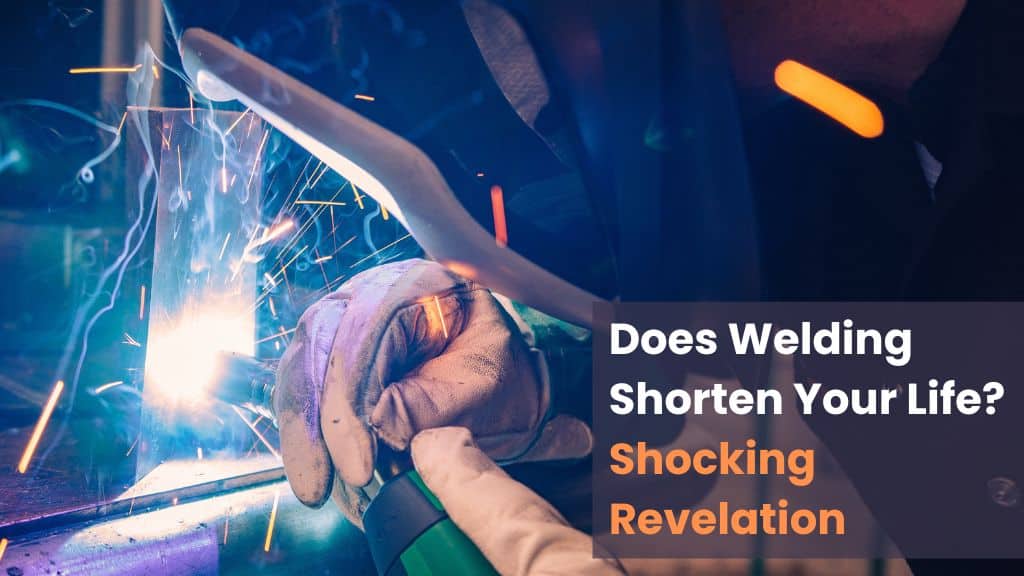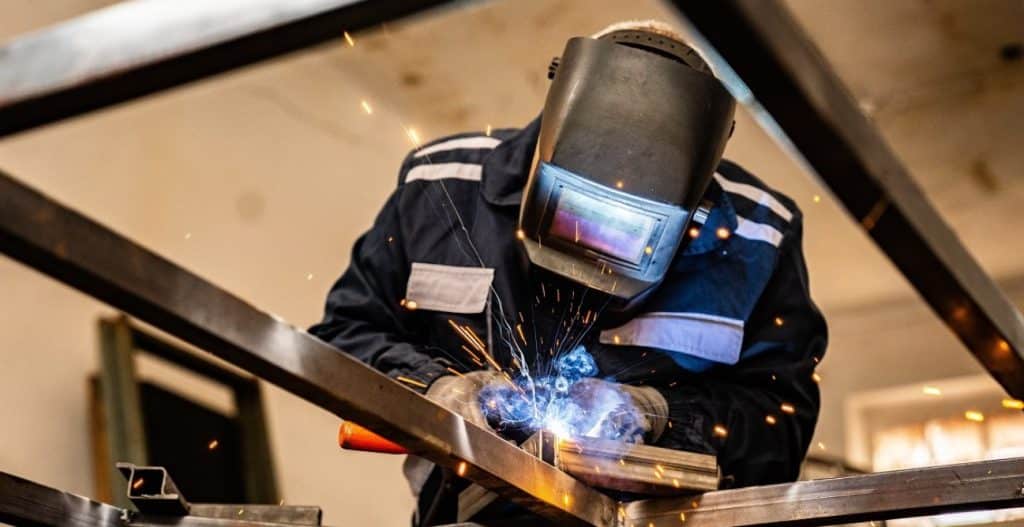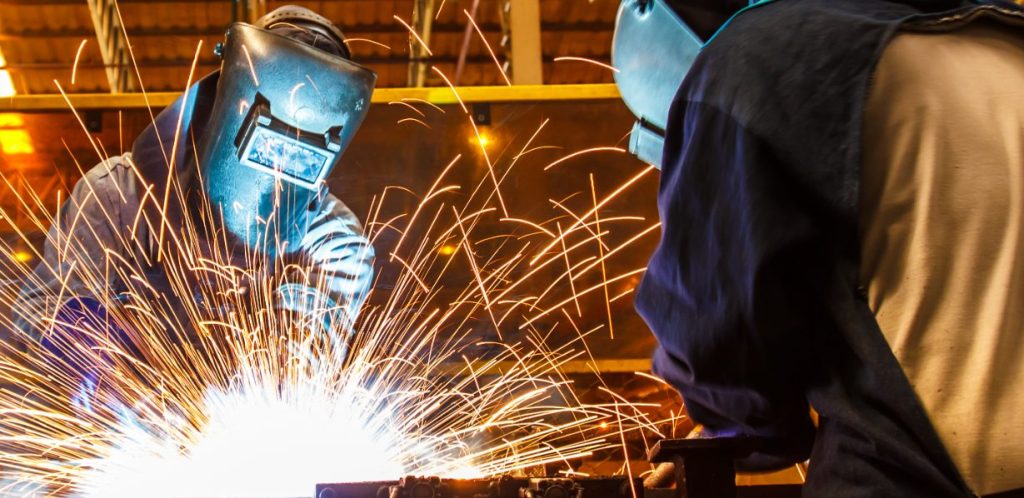Proper welding techniques and adherence to safety protocols can help prevent health issues. However, if you neglect proper safety measures such as wearing a respirator while welding and cutting galvanized materials or using inadequate eye shielding, you risk developing eye or lung problems.

Welding is an essential process used in many industries to join metal parts together. However, the process involves risks that can pose health hazards to welders.
Over the years, concerns have been raised about the potential health risks of welding, with many people asking whether welding shortens your life. In this blog post, we’ll explore the available data on the topic and help shed some light on the issue.
Hidden Dangers of Welding
Welders often regret not taking care of their health when they were younger. Research suggests that several short-term health concerns associated with welding can be prevented.
However, the long-term effects of welding are often unseen and ignored until welders reach an age where the consequences of their neglect can no longer be ignored. The gases and compounds created during welding can harm all organs of the body and have the potential to cause various dangerous illnesses, including cancer.
Immediate Effects
Welding can cause minor side effects such as nausea, headache, breathlessness, cough, skin, eye, and nasal inflammation. Asthma, fever, and even dementia may also occur. These effects are temporary and can be relieved by using milk.
Invisible Effects
The gases absorbed during welding can cause major medical problems. The sounds that did not seem loud can damage your hearing.
The components that did not seem heavy can cause shoulder problems. Knee problems may develop due to frequent reclining.
Small work-related actions can compound and contribute to sickness later in life. By making a few easy modifications to your everyday routine, you can greatly minimize your likelihood of these conditions.
Effects on the Skin
Welding can cause contact rash and inflammation, or skin discoloration, on the welder’s skin. The most common skin condition is inflammation, which looks like a sunburned region. The flesh of welders is also susceptible to UV rays.
Effects on Hearing
Chemicals that welders consume may affect their hearing. Several investigations have shown a link between chemical agents and audible damage. Breathing excessive quantities of fumes lowers the amount of oxygen that enters the bloodstream.
The sound produced by welding is the most evident hazard to hearing. Welders may not be aware that heat is a health threat. Many who would use headphones or earmuffs while polishing metal may forego such gear before welding.
Welding is sometimes loud enough to induce modest nerve cellular injury. Therefore, you should use earplugs to avoid auditory neuropathic pain.
Disorders of the Nervous System
Welding has been linked to Parkinson’s disease and parkinsonism. Slow movements, stiffness, tremors, stooped posture, and other symptoms are some neurological conditions caused by welding.
It is caused mostly by nickel and chromium exposure. This may or may not result in death, but living with it becomes a hassle.
Flash Burns
Welding produces sparks and waves that can burn the welder’s skin, eyes, oral mucosa, and nose passages. Welding generates a lot of heat, which can cause burns on sensitive body parts.
It creates acute eye injuries, which is the most harmful aspect. Arc eyelids, a type of eye condition, can be caused by welding. To protect oneself against fires, one must wear protective gear.
Inflammation of the Esophagus and Lungs

Welding fumes contain gases and small particles that can cause throat irritation, coughing, and breathlessness.
While tungsten inert gas (TIG) riveting stainless steel and aluminum, ozone may create this. Different levels of nitrogen dioxide, produced during certain arc welding processes, also cause irritation. Excessive ozone inhalation can create fluid in the airways.
Laceration
Welders are always vulnerable to injury. Objects landing on the head or any part of the body can cause injury. Significant cuts and concussions are also common. Accidents may happen at any time, and unintentional fatalities are seldom reported. Welders must exercise extreme caution while dealing with mishaps.
Does Welding Shorten Your Life?
The question of whether welding shortens your life is a complex one that requires a nuanced answer. While welding can pose health risks to welders, the available data does not suggest that the process shortens their lifespan.
According to a study published in the Journal of Occupational and Environmental Medicine, welders have a similar life expectancy to the general population.
The study analyzed mortality data for over 37,000 welders and found no significant difference in their life expectancy compared to the general population. The study also found that welders had a lower risk of dying from cardiovascular disease than the general population.
Another study published in the Journal of Occupational Medicine found that welders had a slightly higher risk of lung cancer than the general population.
However, the study authors noted that the increased risk was only observed in welders who had been exposed to high levels of welding fumes for over 30 years.
It’s worth noting that the available data on the health effects of welding is limited and that more research is needed to fully understand the risks involved. However, the available data suggests that welding does not significantly shorten the lifespan of welders.
How Many Underwater Welders Die A Year?
The yearly fatality rate for approximately 3,000 full-time underwater welders is five, with drowning being the leading cause of death.
According to both old and recent statistics, 11 welder-divers die each year. To ensure your safety while welding, it is crucial to take necessary precautions.
- Always work in a well-lit area with good ventilation, and set up the workspace to allow toxic fumes to escape.
- Clean welding surfaces frequently to prevent poisonous metals from settling, and wear necessary safety equipment such as hats, protective clothing, defensive shields, gowns, and goggles. In addition, wear safety masks and respirators and consider using an exhaust system.
- When welding on wet surfaces, wear thick boots and insulators to prevent any harm to your health. Remember, protecting your health while welding is your responsibility.
Protecting Yourself as a Welder
While the available data suggests that welding does not shorten your life, it’s still essential to take steps to protect yourself as a welder. Some of the things you can do to minimize your exposure to welding hazards include:
Use Protective Equipment

Wear appropriate protective equipment such as helmets, goggles, gloves, and respirators to protect yourself from welding fumes and other hazards.
Ventilate Your Workspace
Ensure that your workspace is well-ventilated to minimize your exposure to welding fumes. Consider using a local exhaust ventilation system to remove fumes from your workspace.
Practice Good Hygiene
Wash your hands and face regularly to remove any welding fumes that may have settled on your skin. Change out of your work clothes before leaving your workspace to avoid taking any fumes home with you.
What Percentage Of Welders Get Cancer?
The exact percentage of welders who get cancer is not known. However, welders are exposed to various hazardous materials and fumes that can increase their risk of developing cancer, including lung cancer, bladder cancer, kidney cancer, and others
How Long Do Welders Live?
The lifespan of welders can vary depending on various factors such as their lifestyle, work environment, and genetics. There is no set age limit or lifespan for welders.
Does Welding Damage Your Eyes?
Welding can be harmful to the eyes, and welders are at risk of developing a range of eye-related problems. The intense light and radiation produced during welding can cause damage to the eyes, such as arc eye or photokeratitis, which can lead to blurred vision, sensitivity to light, and other symptoms.
What Age Do Welders Retire?
The retirement age for welders can vary depending on the country and employer. In the US, the retirement age for most workers is 65, but some employers may have different policies for their employees.
Does Welding Cause Cancer?
Welding can increase the risk of developing cancer, but not all welders will develop cancer. The risk of cancer depends on several factors such as the type of welding process, duration of exposure, and personal protective measures taken by the welder.
Does Scuba Diving Shorten Your Life?
Scuba diving does not necessarily shorten your life. However, like any sport or recreational activity, there are risks involved, and divers must follow proper safety protocols and training to minimize those risks. Accidents, such as decompression sickness, can occur while scuba diving, which can be life-threatening.
What Is The Typical Retirement Age For Welders?
While the median age of welders may not be retirement age, a significant portion of them will be approaching it in the near future. According to the BLS, 44% of the welding workforce was aged 45 or older in 2023.